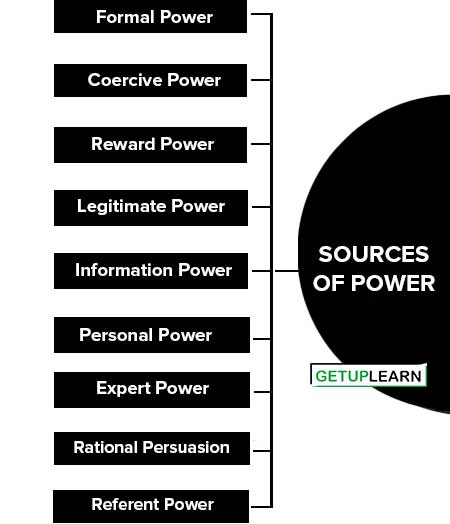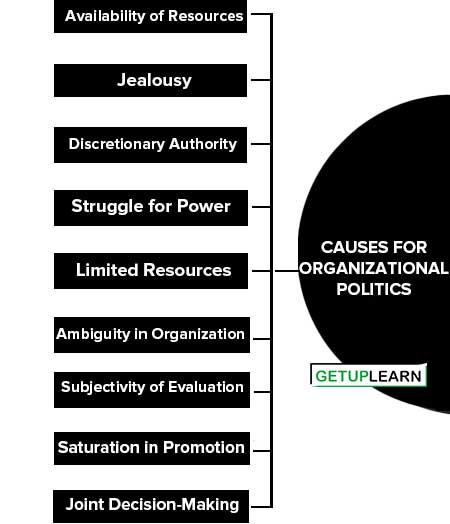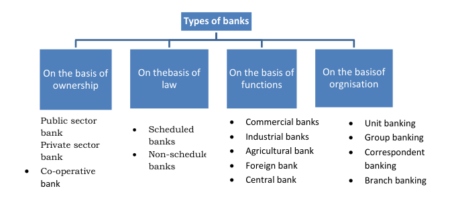Table of Contents
Power and Politics in Organizations
Organizations are built by the aggregation of people for some common goals, and in order to achieve these goals, people should behave in a manner specified by organizational rules, regulations, policies, and other methods, organizations try to achieve this through the process of influencing the behavior of their members.
The process of influencing the behavior of people working in an organization for getting the desired result may be termed as power because influence is a behavioral response to the exercise of power.
Definition of Power
Thus power refers to a capacity that Mr. A has to influence the behavior of Mr. B. so that B acts in accordance with A’s wishes. The definition implies (1) a potential that need not be actualized to be effective (2) a dependence relationship and (3) That B has some discretion over his or her own behavior.
Getuplearn
Hence it can be visualized that a person can have power over you only if he or she controls something you desire.
Characteristics of Power
- Power is one of the means like the use of authority, leadership, and communication to influence others for getting results.
- The influence process occurs in a particular way when it is attempted by the use of power.
- Power is used not only to get certain results achieved but it also includes negative decisions or the action of nondecisions.
- Power is extra organizational in nature and anyone in the organization may have this type of influence through the use of power provided one is capable of doing so.
Authority is another means of influencing the behavior of people in the organization. In fact, authority is a right of a person to give orders and power to have obedience. It is the right to guide and direct the actions of others with the hope to get appropriate responses to the attainment of organizational goals.
It is a right to utilize organizational resources and make decisions and get them carried out. Authority is like a thread by which different Units of the organization are integrated. It is the key to all managerial jobs, it means that aspect by which managers have some RIGHT by which we get things done, that right is technically known as AUTHORITY.
It is a legal or rightful power to command or to act, Authority is a binding force in the organization forming the very basis of responsibility, and because of authority and responsibility relationship superior, subordinate relations exist in the organization.
From the above discussion, we can identify the features of authority, which are as follows;
- It is the legitimate right to command direct guide and control the subordinates.
- It is granted as per one’s position in the organization to achieve the pre-determined organizational goals.
- Authority is the key to managerial jobs.
- Authority is the right to direct and make use of others to get things done.
- Authority is a commanding force binding and establishing relationships between different individuals.
Sometimes two terms authority and power are used interchangeably because of their common objective of influencing the behavior of people on whom these are exercised. However, there is a difference between these two while authority is the right to command power is the capacity to command.
The traditional concept of hierarchy finds its essential rationale that someone has the right to command someone else and that the subordinate person has the duty to obey the command. This is implied in the notion of official legitimacy, legal in nature rather than social and informal.
However, the right to command does not necessarily connote the capacity to command. For example, a person in society may have the capacity to influence the behavior of others through his money power but he may not have the right to do so. Thus the major difference between the two can be identified as follows:
- Authority is legitimate by certain rules, regulations, laws, and practices. In the case of power, there is no such legitimization.
- Authority is institutional and originates because of structural relationships. power emerges because of personal factors and varies with the individuals.
- Authority exists in the context of organizational relationships, mostly in superior-subordinate relationships either direct or otherwise. A power relationship may exist between any two persons and an organizational relationship may not be necessary.
Sources of Power
E.L.Lawler have suggested four sources of power, positional personal expert and opportunity. Thus there can be two main sources of Power:
- Formal Power
- Coercive Power
- Reward Power
- Legitimate Power
- Information Power
- Personal Power
- Expert Power
- Rational Persuasion
- Referent Power

Formal Power
Three sources of power are available to a manager the power to force compliance by means solely as a result of his or her position in the organization:
Coercive Power
The power to force compliance by means of psychological, emotional, or physical threats. The Power which rests upon the placation or the threat of application of physical sanctions.
The physical sanctions, out of the exercise of coercive power, maybe in any form depending upon the situation such as the infliction of pain, the generation of frustration through restriction of movement, or the controlling by force of basic physiological or safety needs.
Reward Power
Reward power is the opposite of coercive influence. This power is based on one’s control and allocation of material resources and rewards.
In the organizational situation. this power is based on the control of salaries, wages promotions, compliments, or enriches jobs. People comply with this power because they get benefits out of compliance. Therefore one who can distribute rewards that others view as valuable will have power over those others.
Legitimate Power
The power is granted through organizational structure. It is the power accorded, to people occupying particular positions as defined by the organization. It represents the power a person receives as a result of his/her position in the formal hierarchy. It includes both coercive power and reward power.
Information Power
One of the most important aspects of legitimacy is the access to and control of information. In most organizations, the ‘Right to know’ and use information is restricted and confined by a series of rules and regulations. The nominal reason for controlling information is to protect the organization.
Personal Power
Personal power resides in the individual and is independent of that individual’s position. It is important in many well-managed organizations. Three bases of personal power are:
Expert Power
It is the ability to control another person’s behavior through the possession of knowledge experience, or judgment that the other person does not have but needs. New expertise has become a powerful source of influence as the world has become more technological.
Rational Persuasion
It is the ability to control another’s behavior because, through the individual’s efforts, the person accepts the desirability of an offered goal and a reasonable way of achieving it. Rational persuasion involves both explaining the desirability of expected outcomes and showing how specific actions will achieve these outcomes.
Referent Power
It is the ability to control another’s behavior because the person wants to identify with the power sources. Referent power is based on identification with the person who may have some form of power.
The target of the influence feels attracted to the person having power because of his personality characteristics and tries to behave accordingly. Then this becomes the basis of power exercise. Such an identifying process may take place without organizational context as most people take somebody as ideal and behave accordingly up to a certain stage.
Organizational Politics
Politics is a universal phenomenon in an organized society. Political behavior is not limited to those who hold public positions. We can expect political behavior in every organization. In a very simple way, politics can be referred to as actions for seizing, holding, extracting, and executing power by individuals and groups to achieve personal goals.
There are two views with respect to organizational politics. According to one view which can be termed a self-interest concept in defining organizational politics. “It is the process whereby individuals or groups use whatever power they can amass to influence organizational decisions in the direction of own interest.’
On the other, the second view treats politics as a necessary function resulting from differences in the self-interest of individuals. In the way organizational politics is defined as “It is the art of creative compromise among completed interests.
Thus organizational politics can be viewed as the management of influence to obtain ends not sanctioned by the organization or to obtain sanctioned ends through non-sanctioned means and the art of creative compromise among competing interests.
Main Features of Organizational Politics
- It is an inescapable and intrinsic reality. It is so intricately woven with the management system that relationship norms, processes, performances, and outcomes are hugely influenced and, affected.
- It involves behaviors of individual groups that are self-serving and manipulating to promote their self-interest at the expense of others and sometimes even organizational goals as well.
- It takes place when an individual recognizes that the achievement of the goals is influenced by the behavior of others.
- It is a company that manifests itself through the struggle for resources, personal conflict competition for power, and leadership.
Causes for Organizational Politics
These are the causes for organizational politics explained below:
- Availability of Resources
- Jealousy
- Discretionary Authority
- Struggle for Power
- Limited Resources
- Ambiguity in Organization
- Subjectivity of Evaluation
- Saturation in Promotion
- Joint Decision-Making

Availability of Resources
Employees, if they believe that, they lack information about the job objectives, job opportunities, and the outcome of work performance, low trust level among organizational members, and control over information is a result of legitimate power position within the organization, they certainly employees will receive their work environment as politically motivated.
Jealousy
This is largely common among peers and colleagues in the same department or different departments of the same organization.
At times, personal concerns may tend to displace substantive material in a decision-making process here people become increasingly conscious of influence, proximity, and other such factors which in their opinion may influence the evaluation of similar output.
Organizations provide positions with discretionary authority to use such powers in the case of special needs like emergencies in the organization, such authority then becomes the basis for organizational politics if the discretion power is not equal among the members of the same hierarchy level.
Struggle for Power
Political behavior emerges in the organization because people want to derive power, that is over and above the authority delegation to them formally.
They want to gain power because it is satisfying to them since the quantum of power like other resources it is satisfying to them since the quantum of power like other resources is limited, there is a struggle to gain power.
Limited Resources
Like pay rise and promotion opportunities being not freely available, creates pressures and feelings of competition among the fellow members of the organization. A marked distinction occurs between those who have and those who don’t have power which in turn spurs undercurrents in day-to-day affairs and dealings.
Ambiguity in Organization
Particularly roles and authority generate politics. The more ambiguous formal roles and authority or organization members, the more developed will be the internal system of political competition.
Ambiguity causes people to settle their roles through mutual interactions. In these interactions, people may try to enact the roles most suited to them so that they can show better performance.
Subjectivity of Evaluation
Another reason that spurs power struggles and resultant politicking is the subjectivity that exists in the evaluation structure. A major part of performance evaluation that in turn determines compensation is subjectivity which leads to the same cycle of impression management in the eyes of one’s superior.
Saturation in Promotion
People have a feeling that they have reached a saturation level of promotion. When they reach the maximum level of their talent and skills, they resort to political behavior.
This is what is peter. F. Drucker describes, that, in a hierarchy, every employee tends to rise to the level of incompetence and he will have no other business than to engage in politics.
Joint Decision-Making
Large organizations emphasize joint decision-making to solve common problems faced by various units, joint decision-making generates conflict and politics.
FAQs Section
What are the causes of organizational politics?
The causes of organizational politics are:
1. Availability of Resources
2. Jealousy
3. Discretionary Authority
4. Struggle for Power
5. Limited Resources
6. Ambiguity in Organization
7. Subjectivity of Evaluation
8. Saturation in Promotion
9. Joint Decision-Making.

